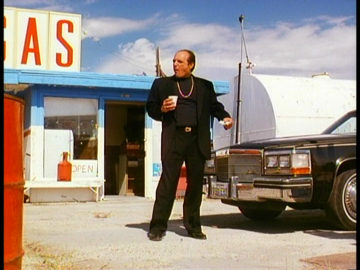|
This film is also known as After the Game.
Tuna's comments in white:
The Last Hand (1995, 1997, 2004) was
completed and copyrighted in 1995, released on German TV in 1997 as
After the Game, and is now in the US on DVD. IMDB scores this 2.0.
Interestingly, over half the votes are perfect 10s, and 9% of the
10s are from people who gave no demographics. The median score is
actually 10, but IMDb makes a mathematical adjustment for
ballot-stuffing.
A man wins big in a Monday night
poker game in Elko Nevada. On the way home with the money, he is
shot and killed, and the car blows up. His son comes to town to find
out what happened. The police have no interest in calling it
anything but a drunk driving accident.
The people in the game all figure
prominently in the plot, so let's run through them quickly. The
casino owner, the brother of the murdered man, another casino owner
the owner #1 is deeply in debt to, and that man's wife (Susan
Traylor). Pay close attention to an ugly briefcase, because
each time it is opened, the contents change among women's underwear,
coke, and lots of money. The casino owner's girlfriend, Hudson Leick,
also figures prominently in the story.
Start Spoilers
Traylor is evidently sleeping with the casino owner, her husband,
the dead man, and pretty much everyone else in town. Leick, it seems, also plays around a lot, but ends
up in the company of the son of the dead man. Everybody wants the
coke, the money, and the deed to the casino, which is almost as
elusive as the magic suitcase. One by one, everyone is killed except
the son of the dead man. We see him hitchhiking out of town
But then the son is
picked up by his dead father. We then see the son dead, being put into
the coroner's wagon. Then they see Hudson Leick hitchhiking as well. The son
says, "Again?" The father answers, "The game is never over."
End Spoilers
The only comment at IMDB says:
"A film noir murder mystery from the camp of Hitchcock, Welles, and
Kubrick.
""After The Game" is a film that was influenced by the Coen
brothers':"Blood Simple", Wim Wenders':"Wings Of Desire", and
Shakespeare's: "Hamlet". It deals on the surface with greed, murder,
deceit, lust, and revenge while on a subtler level it explores the
spiritual world of Karma, and the afterlife. The world as we know it
is only an illusion, much like a movie. I hope "After The Game"
provokes thoughts that both tantalize and enlighten."
Indeed, pretty high praise for writer/director Brewster MacWilliams.
I would have been even more impressed had that not been written by
brewmac@aol.com.
Scoop's comments in yellow:
I love Tuna's review. Oh, Brewster,
dude, you are so BUSTED! The
DVD box says:
"A film noir murder mystery from
the camp of Orson Welles, and Stanley Kubrick. The Last Hand stars
Robert Dubac, Lou Rawls, and Frank Gorshin."
Well, at least he left Hitchcock
and Shakespeare out of that one (how did he miss Tolstoy and
Kurosawa?) but Frank Gorshin and Lou Rawls were not exactly "stars".
The Riddler was in the opening scene and did a wild overacting gig
as the murder victim, after which he was just the dead guy that the
plot revolved around, marked most vividly by his total absence until
the absurd ending which Tuna mentioned. Poor Lou Rawls, once an
A-list singer, seems not to have managed his money when he was
making it, because he now seems desperate for any work he can get. If you
watch this movie without knowing he is in it, then someone informed
you of that a week later, you'd never remember who he was, just a
bit player in a minor movie. Bob Dubac
was the star, and had some talent, but apparently never worked in films again, so I'm not
sure why one would use his name to promote the film.
Tuna's favorite plot gimmick was the
confusing suitcase, but my favorite was the ever-present knife. |

